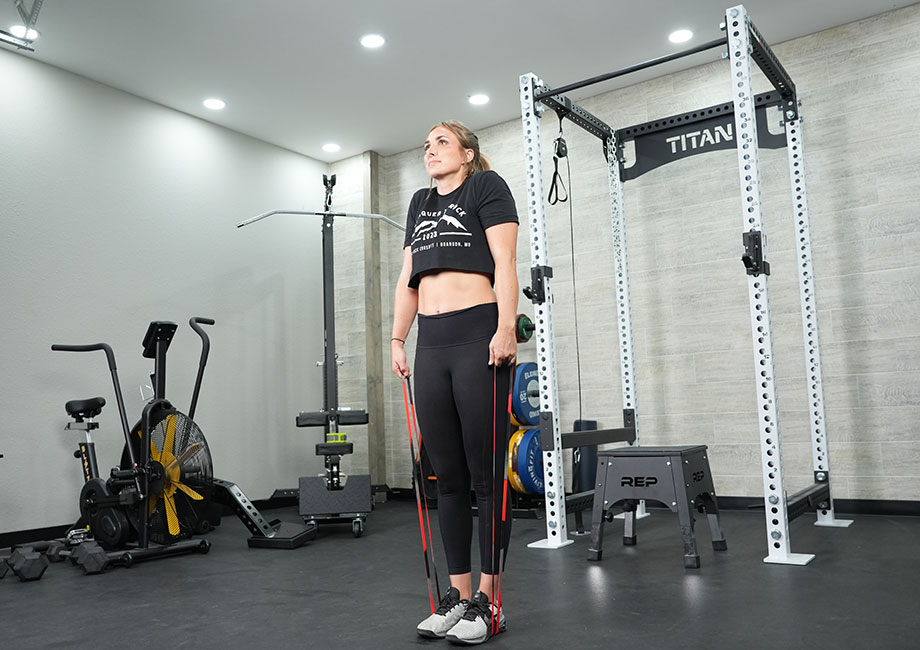We test and review fitness products based on an independent, multi-point methodology. If you use our links to purchase something, we may earn a commission. Read our disclosures.
Only a few lifters think about having a big strong neck and shrug off (see what I did there?) the shrug exercise as unimportant. The dumbbell shrug exercise trains the upper trapezius, which often acts as a cherry on top of a great build. In this certified personal trainer’s opinion, there’s nothing more imposing than a lifter with big traps.
RELATED: Trap Exercises For A Jacked Upper Body
Those massive upper traps, shoulders, and back make the gym-goer look like someone not to be messed with. But there are other benefits besides vanity as to why you should train the upper traps with the dumbbell shrug exercise. Here we’ll learn how and why you should add this movement to your training regimen and some shrug variations to up your upper trap game.
Let’s dive in.
How To Do the Dumbbell Shrug Exercise
Note: You can use the best kettlebells for this exercise if you prefer.
Here is a step-by-step guide on how to do this old-school bodybuilding exercise with good form.
- Grab a pair of dumbbells.
- Grip the dumbbells with a neutral grip with your shoulders down, chest up, and arms by your side.
- Then raise your upper traps towards your ears as high as you can.
- Pause and slowly lower your upper traps down to the starting position.
- Reset and repeat for desired reps.
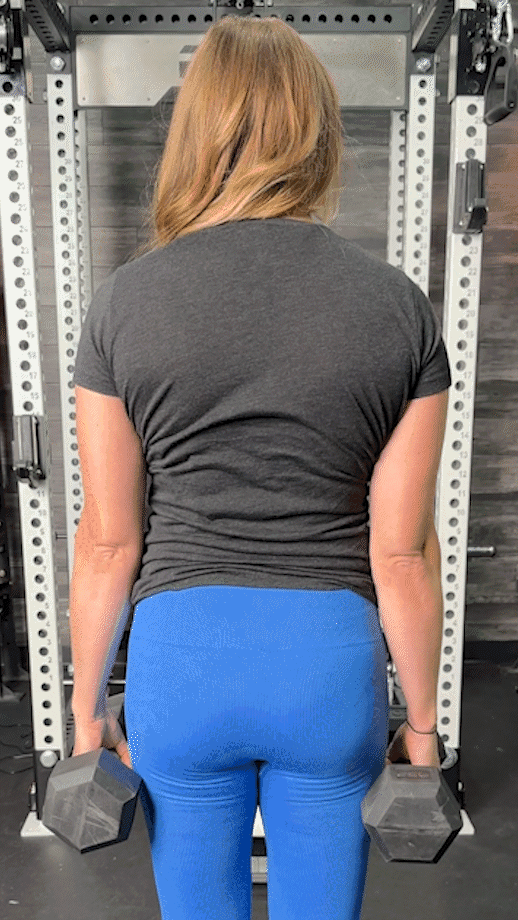
Trainer Tips for Proper Form
Let’s face it; there are more complex exercises to perform than the dumbbell shrug, like pull-ups, lat pulldowns, and the upright row. But that doesn’t mean mistakes can’t be made. Here are a few vital form tips from this CPT.
RELATED: Best Lat Pulldown Machines
If You Can’t Grip It, You Can’t Rip It
You need to perform higher repetitions to get the best out of the dumbbell shrug, an isolation exercise, between the eight to 20 rep range. Ensure you can grip the dumbbells for your entire set, if you can’t, lower the weight. Holding the dumbbells for an extended time is a fantastic way to improve grip strength.
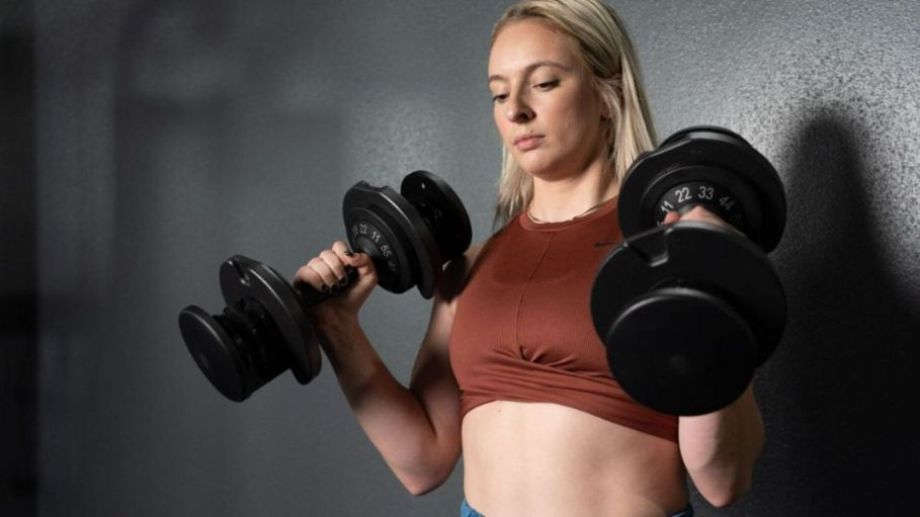
Slow Your Roll
Creating muscular tension is the name of the game when it comes to hypertrophy and building strength. Yes, you can add more weight, but slowing your repetition speed down throughout the entire range of motion ensures more time under tension and gives your upper traps the attention they deserve.
RELATED: How to Build Muscle
Don’t Use Momentum
There is a tendency when the weight gets heavier to recruit other body parts to help perform the dumbbell shrug movement. You’ll get the movement done, but you will take muscular tension off the upper traps, which is the point of this exercise.
Dumbbell Shrug Benefits
Besides having an imposing upper back and neck, here are a few vital benefits of performing shrug variations like the dumbbell shrug in your workout routine.
Improves Deadlift And Squat Form
Shrugs are a back exercise that builds the upper traps. The strength and size of the upper back muscles play a role in squats and deadlifts. When you perform the barbell squat or deadlift, the contraction of the trap muscles plays a vital role in keeping a neutral spine. Stronger upper traps help keep the barbell close when deadlifting.
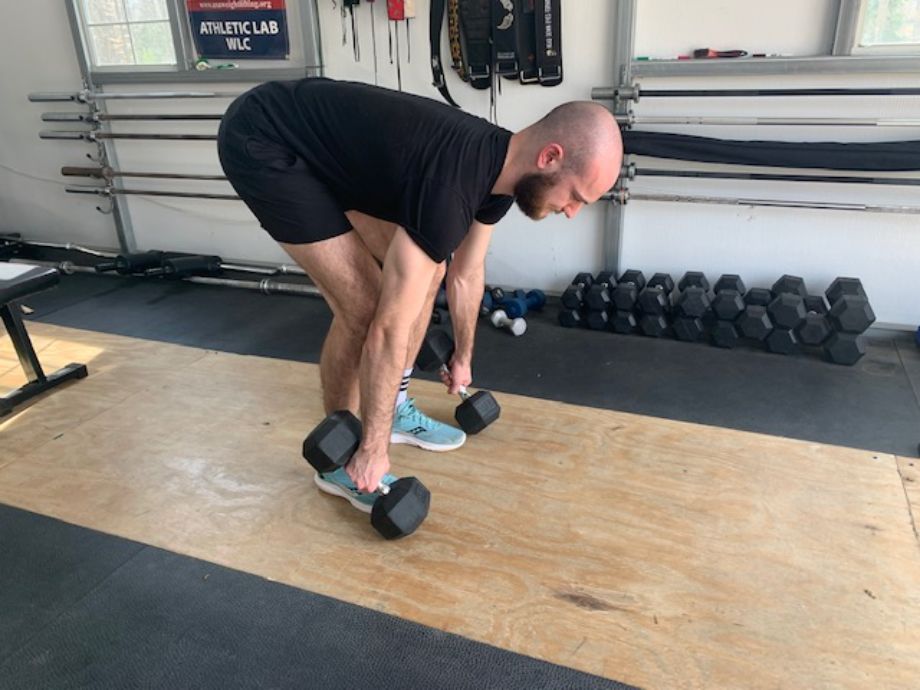
The upper traps provide a place for the barbell to sit while squatting, particularly the high bar squat, and they prevent you from leaning too far forward and turning the squat into a good morning.
Reduces The Severity Of Concussions
Research suggests that strength training the neck muscles reduces the incidence and severity of concussions1. If you’re an athlete in danger of concussions, then it helps to have solid upper traps for protection.
Improves Pulling Strength
The upper traps are a vital muscle group of the upper back, and the upper traps assist in pulling strength (row and deadlift variations) and shoulder stability for movements like heavy carries and Olympic lifts.
RELATED: Best Lifting Straps
Shrug Variations
Dumbbell shrugs are great, but to prevent training boredom and overuse injuries, take these other three shrug variations for a spin.
Trap Bar Shrug
Why do it: The trap bar shrug allows you to use the most resistance, and there is less stress on your wrists and elbows than the barbell shrug because of the trap bar neutral grip.
RELATED: Best Trap Bars
How to do it:
- Step inside the trap bar and set your feet hip-width apart.
- Use good deadlift form to pick up the trap bar from the floor.
- Then get your shoulders down, chest up, and grip tight.
- Elevate the upper traps toward your ears as high as you can.
- Slowly return to the starting position, reset, and repeat.
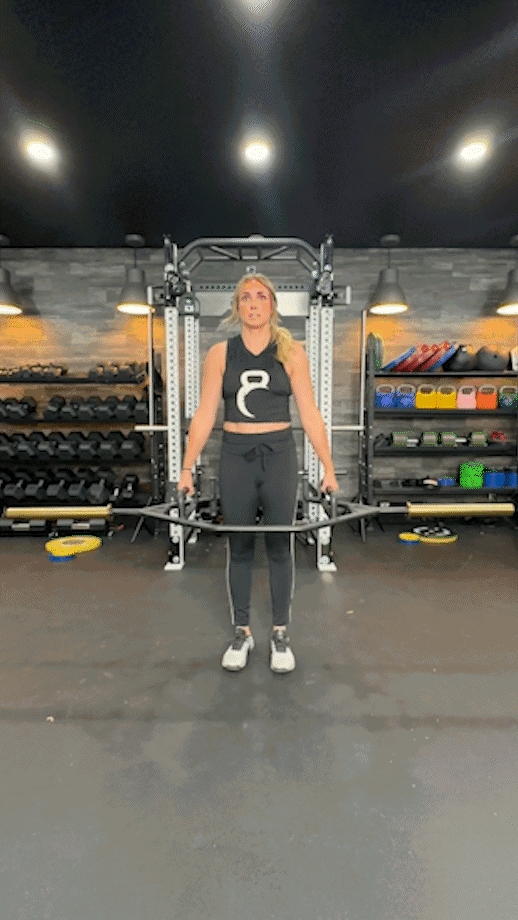
Cable Shrug
Why do it: Performing cable shrugs on the cable stack allows for lighter loading, which benefits higher rep sets and methods such as drop sets, tempo, and pauses.
How to do it:
- Standing in front of a cable stack, grip the rope attachment with both hands with feet shoulder-width apart.
- Ensure you start the movement with your shoulders down and chest up.
- Shrug your upper traps towards your ears without any assistance with your arms.
- Pause, slowly return to the starting position, reset, and repeat for desired reps.
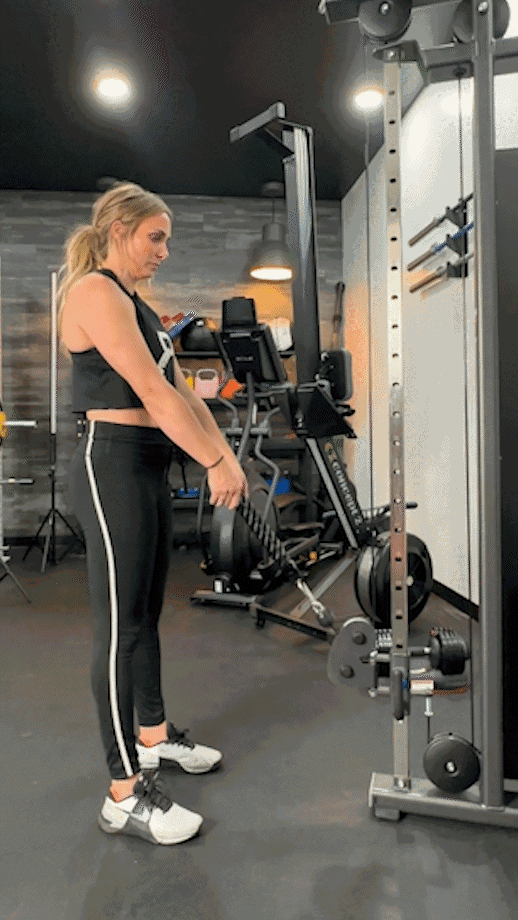
Banded Shrug
Why do it: The beauty of the banded shrug is the band is easier on your upper body joints, and the ascending resistance of the band makes it more challenging at the top of the movement.
How to do it:
- Place a looped resistance band in the middle of both feet.
- Hinge and grip both sides of the band and stand up.
- With your shoulders down and chest up, raise your upper traps towards your ears.
- Pause for a second and slowly return to the starting position.
- Reset and repeat for desired reps.
RELATED: Best Resistance Bands
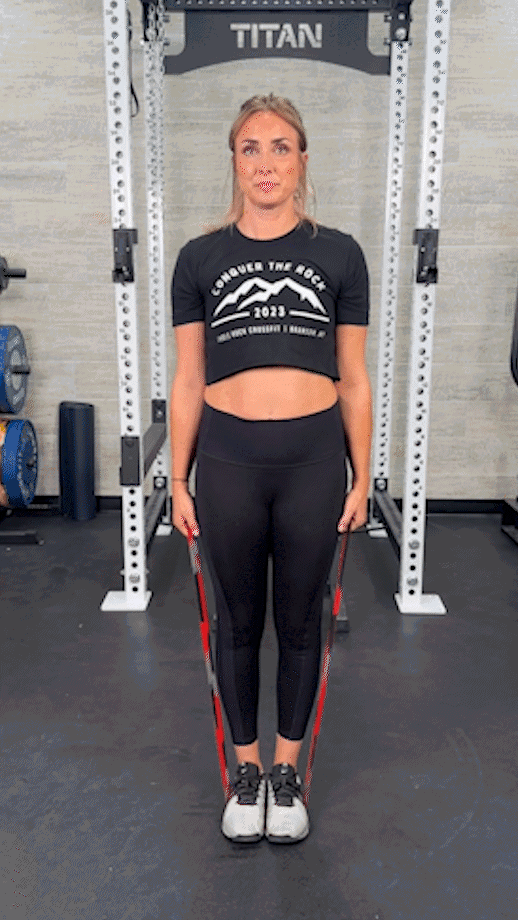
Dumbbell Shrug Exercise: FAQs
What does the shrug exercise work?
The shrug exercise is an isolation exercise, and the primary muscle it trains is the upper traps. The upper traps are on either side of your neck, controlling the shoulder blades’ movement and the upper back and neck.
What is a shrug movement?
Shoulder shrugs are an exercise in which you raise or shrug your trapezius muscles, which are located on either side of your neck.
What muscles do incline shrugs work?
Performing shrugs on an incline focuses more on the middle and lower traps and trains the rhomboids and rear delts. Doing these with upright shrugs leads to better muscular development of your trapezius muscle group.
References
- Honda J, Chang SH, Kim K. The effects of vision training, neck musculature strength, and reaction time on concussions in an athletic population. J Exerc Rehabil. 2018 Oct 31;14(5):706-712. doi 10.12965/jer.1836416.208. PMID: 30443514; PMCID: PMC6222152
Further reading

Follow our seven tips for children-treadmill safety. Read more

In this MapMyFitness Review, we’ll explain what makes this app one of the best options on the market for endurance athletes. Read more

Only a few lifters think about having a big strong neck and shrug off (see what I did there?) the shrug exercise as unimportant. The dumbbell shrug exercise trains the upper trapezius, which often acts as a cherry on top of a great build. In this certified personal trainer’s opinion, there’s nothing more imposing than a lifter with big traps. RELATED: Trap Exercises For A Jacked Upper BodyThose massive upper traps, » Read more about: The Dumbbell Shrug Exercise: How and Why to Do This Movement » Read more

Only a few lifters think about having a big strong neck and shrug off (see what I did there?) the shrug exercise as unimportant. The dumbbell shrug exercise trains the upper trapezius, which often acts as a cherry on top of a great build. In this certified personal trainer’s opinion, there’s nothing more imposing than a lifter with big traps. RELATED: Trap Exercises For A Jacked Upper BodyThose massive upper traps, » Read more about: The Dumbbell Shrug Exercise: How and Why to Do This Movement » Read more

